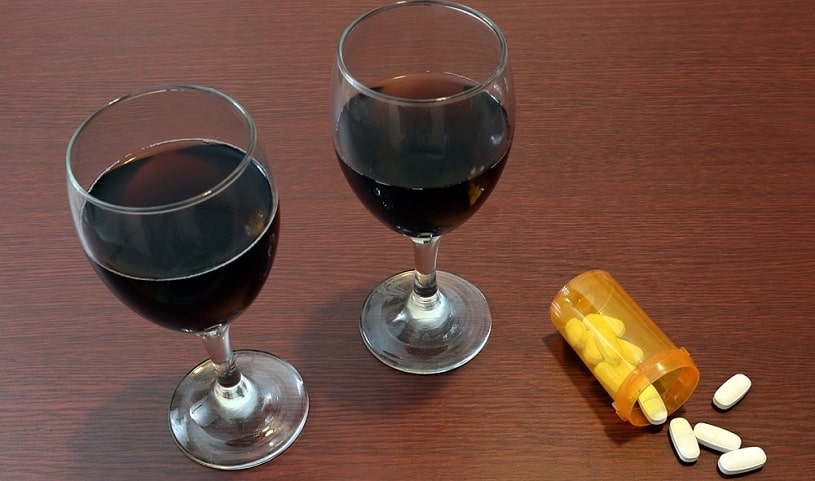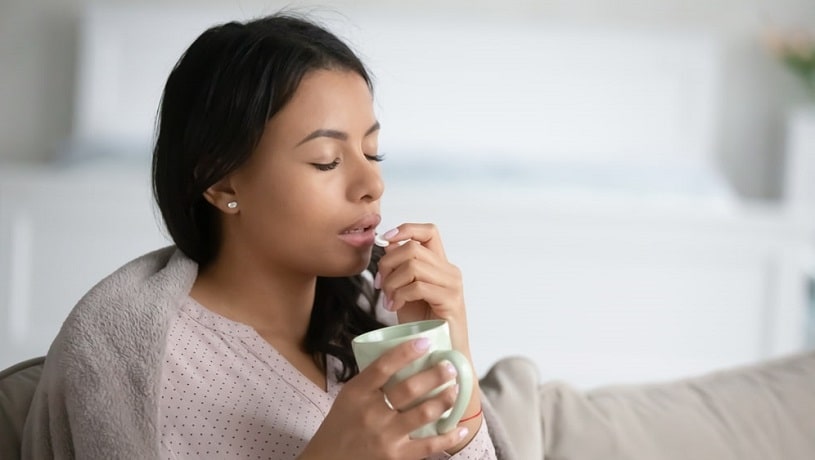Klonopin, known generically as Clonazepam, is a benzodiazepine used to treat a wide variety of medical conditions. It is a depressant because it depresses the central nervous system.
Table Of Contents:
No matter if Clonazepam is used with stimulants or depressants, dangerous interactions are likely to occur.
Klonopin adverse health effects with alcohol and drugs can be severe, which is why it is never recommended that Clonazepam and alcohol or recreational drugs be used together. Additionally, even prescription drugs must be used carefully. Why is it so dangerous? Read below to learn more information about Klonopin and alcohol side effects and Clonazepam interactions.
What Causes Klonopin and Alcohol Use?
The exact reasons why a user might mix or abuse alcohol and Clonazepam varies. In some cases, the user is not aware of the adverse health effects and chooses to indulge in alcohol. In others, the user may want to experience the increased impact caused by the substances. No matter the reasons for combining Klonopin and alcohol consumption, it is hazardous. This substance interaction can not only cause unpleasant symptoms but also lead to the development of an addiction. Addiction to two substances is much harder to overcome and can cause more health problems.

Consuming any amount of alcoholic drinks while taking the drug is risky to one’s health. The higher the doses the higher the risk. There are both short-term and long-term effects of mixing these two items. Moreover, sometimes users can snort Clonazepam, which is a dangerous practice. Snorting the drug and consuming alcohol at the same time may cause unpredictable consequences.
Klonopin for Alcohol Withdrawal
Among the off-label uses of the drug is the treatment of alcohol withdrawal. During alcohol withdrawal, patients can suffer from seizures and anxiety, and Klonopin is effective at alleviating these symptoms.
However, when withdrawing from any substance, relapse is always a possibility. Undergoing professional addiction treatment at a rehab facility and attending support group meetings can lessen the risk but does not eliminate it. Relapse becomes even more dangerous if the withdrawal symptoms are treated with Clonazepam or other benzodiazepines. As explained before, Klonopin and alcohol are a dangerous combination. The long half-life of Clonazepam makes it risky to consume alcoholic drinks even days after the last Klonopin pill. As the drug can stay in one’s system for about five days or more, users can unknowingly put themselves at risk of a harmful drug interaction.
Dangers of Clonazepam and Alcohol
Both drugs work as central nervous system depressants. It means that they slow down all processes within the body. When mixed, their effect is combined. Moreover they both affect the concentration of GABA. It shows that these two substances share some similarities in their mechanism of action.
Also, taking several drugs simultaneously puts extra stress on the liver, which is responsible for metabolizing all substances. Metabolizing alcohol is the main priority, and it can lead to excess amounts of Klonopin in the system.
Short-Term Effects of Mixing Clonazepam and alcohol:
- Dizziness
- Confusion
- Lethargy
- Memory impairment
- Cognitive impairment
- Inability to remain awake
- Dulled reflexes
- Slowed breathing
- Developing a higher tolerance for both
- Poor judgment
- Acute depression
- Suicidal thoughts and actions
Long-Term Effects of Mixing Alcohol and Clonazepam:
- Increased tolerance to both Clonazepam and alcohol
- Persistent dizziness or the development of vertigo
- Fainting
- Extremities that feel heavy and numb
- Cognitive struggles that do not go away
- Inability to form new memories
- Consistent confusion
- Reduced reaction time that does not improve
- Inhibited sexual performance and drive
- Psychological and physical dependency
Unpleasant side effects are not the only danger connected to concomitant use of Klonopin and alcohol. As alcohol increases CNS depression caused by benzodiazepines, it can lead to Klonopin overdose. According to Morbidity and Mortality Weekly Report (MMWR), 27.2% of all benzodiazepine-related ED visits in 2010 involved alcohol use. Among overdose deaths related to benzodiazepine use, 21.4% were caused by a combination with alcohol. This information shows that mixing drugs is far from just harmless, and overdose is a possibility. Certain signs indicate that overdose is occurring, like blurred vision, seizures, loss of consciousness, or loss of coordination.
If these signs are noticed, contact emergency services and get medical help right away.
Other Clonazepam Interactions
Klonopin can interact with many substances, both legal and illegal. There are over 900 drugs clonazepam can interact with. Anyone taking the substance needs to be open with the doctor about other medications they are taking and any recreational drugs they use or alcohol they consume.
Some Of the Substances that Can Interact with Clonazepam Are:
- Street drugs
- Antihistamines
- Azole antifungals
- Barbiturates
- Benzodiazepines
- Bicalutamide
- Birth control pills
- Buprenorphine
- Carbamazepine
- Dexamethasone
- Droperidol
- HIV protease inhibitors
- Macrolide antibiotics
- Muscle relaxants
- Tapentadol
- Tramadol
- Zolpidem
When used with stimulants, such as cocaine or abused prescription medications, there is a high risk of overdose on the stimulant. This is because the depressant effect of Clonazepam makes it harder to reach the effect that the stimulant offers, leading the user to take more than is safe. Sometimes Clonazepam and Adderall prescribed together can be used as legitimate medical therapy, but if the combination is misused or taken recreationally, there are significant risks. Clonazepam interactions with Adderall are non-existent when taken correctly.

Taking Clonazepam with drugs that are depressants is even more dangerous. Because central nervous system depressants slow heart rate and breathing, taking multiple depressants risks these functions from ceasing altogether. Clonazepam must never be taken with another depressant, including alcohol, unless done under a doctor’s supervision.
Additionally, Clonazepam is dangerous if one is allergic to it or other benzos or has acute narrow or closed-angle glaucoma, myasthenia gravis, breathing problems, liver disease, or sleep apnea.
Klonopin and Weed
Marijuana is a drug that can fall under the category of depressants, stimulants, or hallucinogens. Because it does have depressant qualities, it shouldn’t be combined with any other CNS depressants, as per National Institute on Drug Abuse. Klonopin and weed effects will depend on the dosage taken; still, the combination is not life-threatening. The combination of Klonopin and weed can exacerbate the symptom that is being treated by benzodiazepines, which is anxiety. Other side effects that can occur include drowsiness, confusion, difficulty concentrating, and dizziness.
Klonopin and Prozac
Prozac is an antidepressant of the selective serotonin reuptake inhibitor class, used in the treatment of panic disorders, major depressive disorder, and others. Study shows that concomitant use of Klonopin and Prozac in low doses is safe and effective in decreasing anxiety and sleep disturbance symptoms.

Another study from the Journal of Clinical Psychiatry proves that combining SSRI medications with benzodiazepines can provide some benefits for the patient. Namely, it can reduce SSRI-induced anxiety and ensure more rapid control over it. However, self-medication is not recommended, as the treatment methods can vary for each patient depending on their condition and overall health. Always consult your doctor before starting the treatment with any medication.
Klonopin and Trazodone
Mixing similar drugs is dangerous; however, Klonopin and Trazodone work differently in the brain. Trazodone inhibits the reuptake of serotonin, while Klonopin enhances GABA activity, slowing down the brain. This drug combination is not life-threatening, but it doesn’t come without a risk of unpleasant adverse reactions. Mixing these drugs can lead to their amplified side effects. These effects include diarrhea, headaches, drowsiness, muscle aches, and others.
Avoiding Polydrug Use
When taking Klonopin, it is important never to mix Clonazepam and alcohol or use Clonazepam with drugs. Because of the way it works on the body, any mixture, whether with stimulants or depressants, can lead to deadly consequences. There are over 900 drugs that can cause Clonazepam interactions, so being honest with doctors and only taking prescribed medication is vital throughout the duration one is taking Klonopin. However, if someone is already using other drugs or alcohol along with Clonazepam, there is hope through Klonopin addiction treatment.
Treatment for Klonopin addiction is sometimes complicated, especially when addiction to other drugs simultaneously is a factor, as it often is. Detoxification from all drugs has to occur, which means the user may experience intense and often painful withdrawal symptoms. Detoxification from drugs should be done under medical professionals’ supervision who can assess the situation and provide emergency medical intervention if needed.
Hope Without Commitment
Find the best treatment options. Call our free and confidential helpline
Most private insurances accepted
Page Sources
- U.S. National Library of Medicine, Clonazepam. https://medlineplus.gov/druginfo/meds/a682279.html
- Centers for Disease Control and Prevention, Alcohol Involvement in Opioid Pain Reliever and Benzodiazepine Drug Abuse–Related Emergency Department Visits and Drug-Related Deaths — United States, 2010, 2014. https://www.cdc.gov/mmwr/preview/mmwrhtml/mm6340a1.htm
- National Institute on Drug Abuse, Is it safe to use prescription drugs in combination with other medications? 2020. https://www.drugabuse.gov/publications/research-reports/misuse-prescription-drugs/it-safe-to-use-prescription-drugs-in-combination-other-medications
- Londborg, P. D., Smith, W. T., Glaudin, V., & Painter, J. R. (2000). Short-term cotherapy with clonazepam and fluoxetine: anxiety, sleep disturbance and core symptoms of depression. Journal of affective disorders, 61(1-2), 73-79. https://pubmed.ncbi.nlm.nih.gov/11099743/
- Dunlop, B. W., & Davis, P. G. (2008). Combination treatment with benzodiazepines and SSRIs for comorbid anxiety and depression: a review. Primary care companion to the Journal of clinical psychiatry, 10(3), 222–228. https://doi.org/10.4088/pcc.v10n0307
- Shin JJ, Saadabadi A. Trazodone. [Updated 2020 May 28]. In: StatPearls [Internet]. Treasure Island (FL): StatPearls Publishing; 2021 Jan-. Available from: https://www.ncbi.nlm.nih.gov/books/NBK470560/
- National Institute on Alcohol Abuse and Alcoholism, Harmful Interactions, 2003. https://www.niaaa.nih.gov/publications/brochures-and-fact-sheets/harmful-interactions-mixing-alcohol-with-medicines
- Hughes, J. R. (2009). Alcohol withdrawal seizures. Epilepsy & Behavior, 15(2), 92-97. https://www.sciencedirect.com/science/article/abs/pii/S1525505009000936
- Harvard Health Publishing, Alcohol Withdrawal, 2019. https://www.health.harvard.edu/a_to_z/alcohol-withdrawal-a-to-z

 Authored by
Authored by  Reviewed by
Reviewed by 